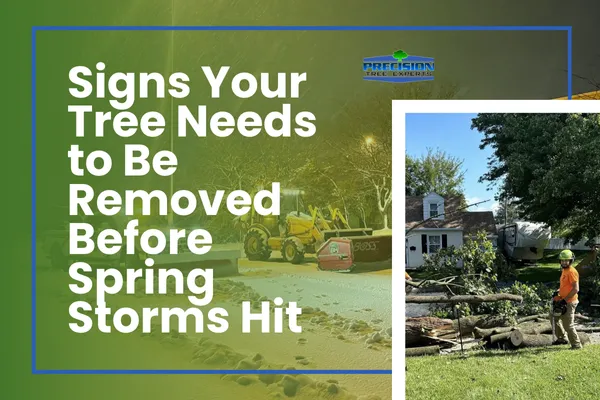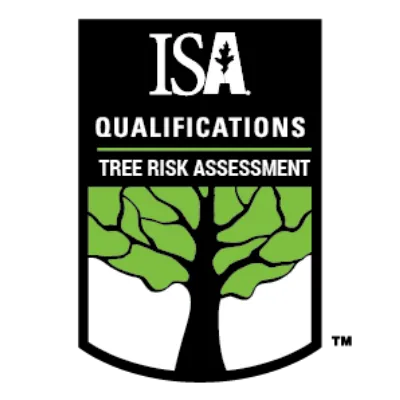
Signs Your Tree Needs to Be Removed Before Spring Storms Hit
Spring storms don't play around here in Pennsylvania and New Jersey.
One minute it’s sunny, the next you’re dodging flying branches and wondering why you didn’t call someone about that sketchy oak in your backyard.
If you’re looking at your trees right now and thinking "Eh, it’ll probably be fine," that's your first red flag. Trees that are already damaged, diseased, or dying are basically landmines when the winds pick up.
Before spring unleashes its usual chaos, here’s how to spot when a tree needs to go — and save yourself a whole lot of heartache (and insurance claims).

Why Dangerous Trees Are a Bigger Threat in Spring
Spring storms mean heavy rain, high winds, saturated ground, and lightning. That perfect storm (pun intended) weakens root systems and snaps brittle limbs like twigs.
When a compromised tree meets a 40 mph gust, it’s not a question of if it’ll fall. It’s when and what it’s going to crush on the way down.
Taking care of unstable trees before spring storms hit isn’t just smart — it’s protecting your home, your family, and your wallet.
Top Signs Your Tree Needs Removal (Before It's Too Late)
1. The "Leaning Tower" Effect
If a tree is leaning more than 15 degrees (especially if that lean is new), it's compromised. Strong roots don't let trees tip without a fight.
Quick Test: If the lean gets worse after rainstorms? Call a professional. Yesterday.
2. Cracks in the Trunk
Long vertical cracks, deep splits, or missing chunks of bark mean internal damage. Trees don't heal like humans — a big crack is basically a ticking clock.
Rule of Thumb: If you can fit a quarter into the crack, it's not "character," it's structural failure.

3. Dead or Hanging Limbs
Big dead branches = future missiles. They're unpredictable, especially during strong winds.
Warning: Branches hanging over driveways, homes, or power lines are priority #1.
4. Root Problems
Heaving soil around the base?
Mushrooms growing out of roots or trunk?
Visible root damage?
Bad roots mean the tree is one gust away from becoming firewood… on your roof.
5. Hollow or Decayed Trunk
If a third or more of a tree’s interior is hollow, it's on borrowed time. You might not see decay from the outside — but a hollow trunk can't hold up much in a storm.
Pro Move: Tap the trunk. Hollow sounds? Get it checked.
6. Too Close for Comfort
Trees within 15 feet of your house need extra scrutiny. In storm season, proximity matters more than size.
Roots can lift foundations.
Limbs can break windows.
Entire trees can crash through living rooms.
(And no, "but it's always been fine" is not a good excuse.)
7. Major Pest or Disease Damage
Boring insects, cankers, fungus, leaf rot — pests don't just weaken trees; they hollow them from the inside out.
If a tree’s been a bug buffet all winter, it’s probably not structurally sound.

Common Trees That Need Extra Attention Before Storm Season
Not all trees are created equal when it comes to storm resilience. Watch these closely:
Bradford Pears: Gorgeous, fragile disasters.
Silver Maples: Fast growers with weak wood.
Willows: Lovely, but snap-happy.
Pines: Tall, shallow roots = fall risk.
Any tree over 30 years old that's never been professionally pruned.
Should You Remove It or Try to Save It?
Sometimes, strategic trimming can stabilize a tree. Other times, it's cheaper (and way safer) to remove it entirely.
When removal is usually smarter:
More than 50% of the canopy is dead.
Major trunk damage.
Severe root rot.
Leaning dangerously toward structures.
Located under high-value areas (homes, driveways, utilities).
Still not sure? Get a professional inspection. A trained eye spots things the average person can’t — and no offense, but Google isn’t going to catch a hidden root problem.

FAQs About Pre-Storm Tree Removal
How much does tree removal cost?
Depends on size, location, and risk level. But it's way cheaper than replacing a crushed roof.
Can’t I just trim the dangerous parts?
Sometimes — but trimming won’t fix a rotting trunk or a failing root system.
What’s the fastest way to get a tree removed before a storm?
Call a professional. Explain the situation. Emergency slots fill up fast when storms are forecasted.
Can trees recover from storm damage?
Mild damage? Maybe. Heavy splits, uprooting, or major cracks? Not a chance.
Conclusion: Better Safe Than Sorry
Look, nobody likes cutting down a tree. But losing a tree the hard way — during a spring storm, onto your house, car, or neighbor’s fence — costs a lot more than a scheduled removal.
If you’re seeing any of the signs we covered, don’t cross your fingers and hope. Get it handled. Your wallet (and your insurance agent) will thank you.
Think you might have a risky tree?
Visit Precision Tree Experts today to schedule an inspection or removal service before spring storms arrive!








